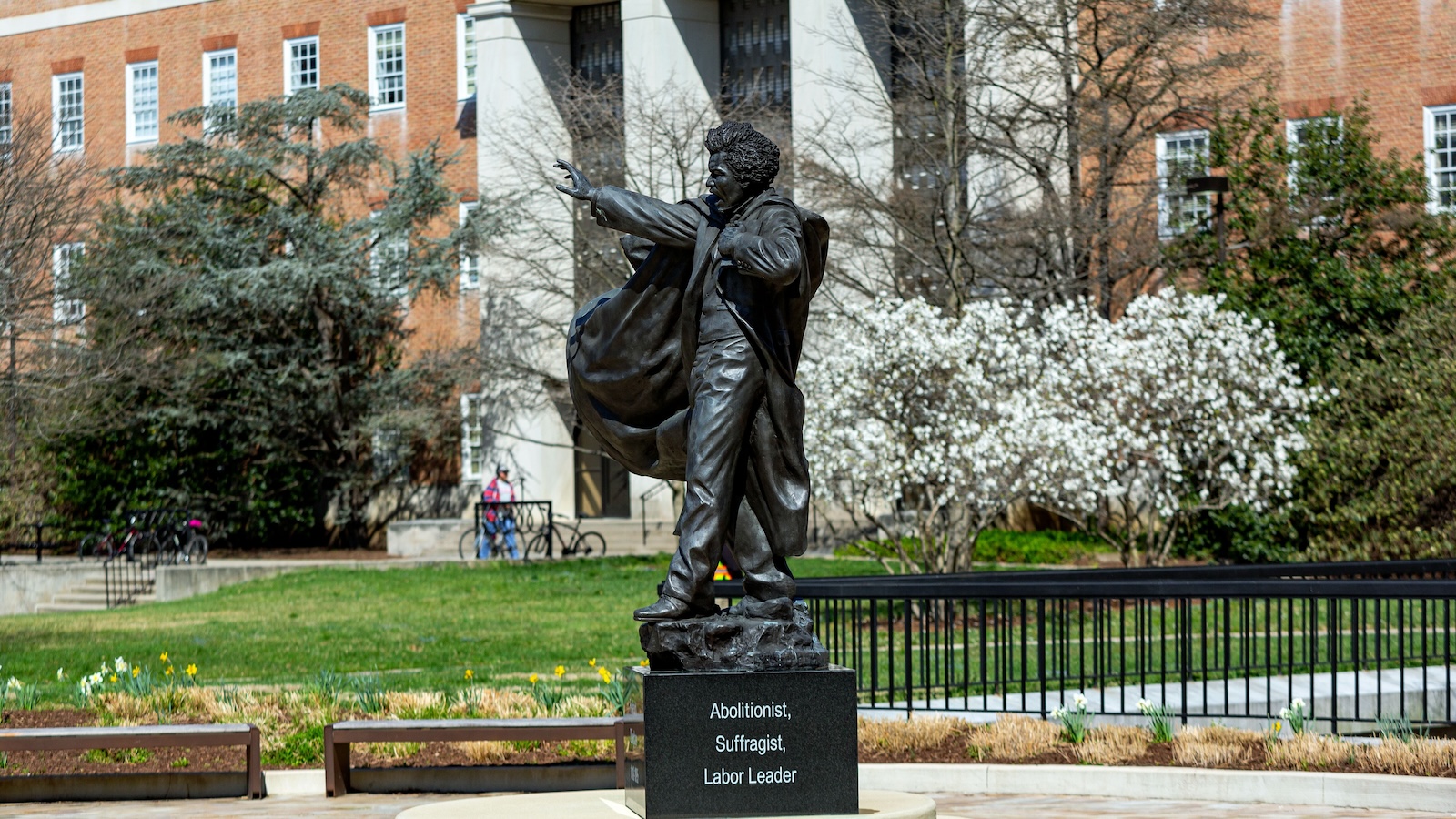Legendary Poet, Activist and Educator Nikki Giovanni to Help Inaugurate New Frederick Douglass Center
April 08, 2024

The center is dedicated to engaging diverse communities—both at the university and well beyond—around issues of social justice and equity.
By Jessica Weiss ’05
The author of two dozen books and a revered voice on issues at the core of American consciousness, like race, gender, love and family, Nikki Giovanni will visit the University of Maryland on April 24 to discuss her work and lifelong commitment to the arts and humanities in an intimate conversation.
It marks the official launch of the College of Arts and Humanities’ (ARHU’s) new Frederick Douglass Center for Leadership Through the Humanities, dedicated to engaging diverse communities—both at the university and well beyond—around issues of social justice and equity and creating leaders with values rooted in the humanities. The center’s activities, which include varied learning and funding opportunities, public events and more, seek to embody the core values of abolitionist Frederick Douglass, who was born into slavery in Maryland and went on to become a prominent writer, orator, publisher, civil rights leader and government official.
Giovanni, too, paved her own path. After self-publishing her first poetry collection in 1968, she published numerous volumes of poetry, nonfiction works, illustrated children’s books, collections of essays and multiple recordings. Her poetry seeks to uplift the Black experience. She is the recipient of countless honors and awards including the Langston Hughes Medal and several NAACP Image Awards, and has also taught and lectured at universities all over the world.
At UMD, she’ll be in conversation with ARHU Associate Dean and Douglass Center Director GerShun Avilez, professor of English, and ARHU Dean Stephanie Shonekan, professor of ethnomusicology, followed by a Q&A with the audience.
“Giovanni is an artist, an activist, an educator—she captures everything that we think that Douglass’ legacy embodies,” said Avilez. “We couldn’t think of a better person to help us celebrate the launch of the center.”
Shonekan said the center stems from her persistent, lifelong belief that society would be far more “literate, empathetic, knowledgeable and communicative” with leaders who are humanists. She arrived at the university in 2022 eager to put that into practice, and came up with the idea while walking on campus one day.
“As my wonderful dean team was thinking about this shared belief, I happened to walk by the statue of Frederick Douglass outside Hornbake, and the idea to create a leadership program based on the humanities crystallized,” she said. “There is no other Marylander that exemplifies leadership through the humanities—the power of reading, writing, thinking, communicating, ethics, language and culture—more than Douglass.”
Rather than focusing on humanities scholarship alone, Shonekan and her team envisioned a center that would have a life both on and off campus, helping the university community and the public to think about leadership and activism in the 21st century and how the humanities can help address social issues.
The center has an “expansive understanding of leadership,” Avilez said, and seeks to reach teachers, community activists, artists and many others who may not necessarily consider themselves as such.
It has held programming since last summer, when it ran an online “Humanities Institute” for middle and high school teachers from across the region. Led by UMD faculty, participants learned about a range of topics—like cheating and morality in the context of chat GPT; teaching Frederick Douglass’ narrative; and how to integrate hip-hop and pop culture into the classroom—as a way to bring critical perspectives rooted in the humanities into their teaching. The institute will be held in person this summer.
And last month, the center presented a screening of “Lowndes County and the Road to Black Power,” a documentary that tells the story of citizens and activists who faced violence and oppression in the struggle for the right to vote in Lowndes County, Alabama, a rural, impoverished town with a vicious history of racist terrorism. The event included a Q&A with three veteran organizers from the Student Nonviolent Coordinating Committee, who reflected on their activism in the 1960s. It was attended by over 100 people, most of whom were area teachers and community activists.
The center is also running two grant programs to support faculty and graduate students’ publicly-engaged research. And more opportunities will be announced soon for undergraduates.
“We want everyone on campus to understand the value of the humanities,” Avilez said. “Whether history, ethics or equity, the humanities have always helped us understand complex social problems; they've always given us a way of imagining new and better futures.”
The Frederick Douglass Center Launch With Poet Nikki Giovanni, which is co-sponsored by the College of Arts and Humanities, the Division of Student Affairs and Arts for All, will be held Wednesday, April 24, from 5:30-7:00 p.m. in the Brendan Iribe Center’s Michael Antonov Auditorium. This event is at capacity, but stay tuned for information about a standby line.

